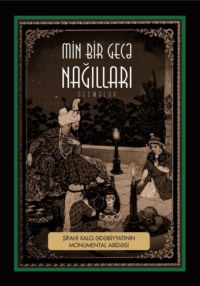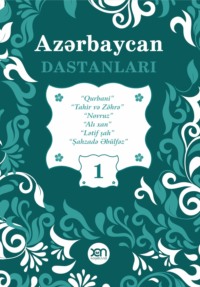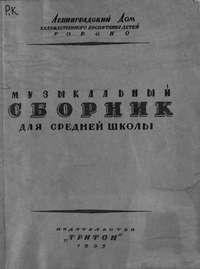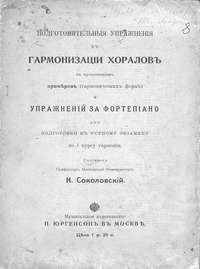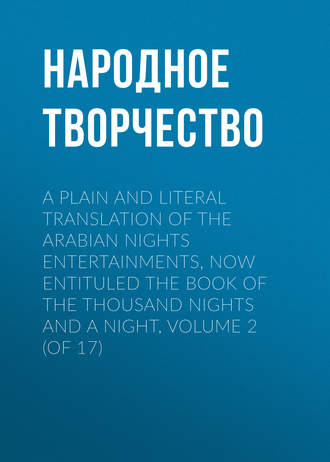 полная версия
полная версияA plain and literal translation of the Arabian nights entertainments, now entituled The Book of the Thousand Nights and a Night, Volume 2 (of 17)
480
Arab. "Kasabát"="canes," long beads, bugles.
481
Koran, xcvi. 5.
482
Both words (masc. and fem.) mean "dear, excellent, highly-prized." The tale is the Arab form of the European "Patient Griselda" and shows a higher conception of womanly devotion, because Azizah, despite her wearisome weeping, is a girl of high intelligence and Aziz is a vicious zany, weak as water and wilful as wind. The phenomenon (not rare in life) is explained by the couplet: —
I love my love with an S —
Because he is stupid and not intellectual.
This fond affection of clever women for fools can be explained only by the law of unlikeness which mostly governs sexual unions in physical matters; and its appearance in the story gives novelty and point. Aziz can plead only the violence of his passion which distinguished him as a lover among the mob of men who cannot love anything beyond themselves. And none can pity him for losing a member which he so much abused.
483
Arab. "Sháhid," the index, the pointer raised in testimony: the comparison of the Eastern and the Western names is curious.
484
Musk is one of the perfumes of the Moslem Heaven; and "musky" is much used in verse to signify scented and dark-brown.
485
Arab. "Mandíl": these kerchiefs are mostly oblong, the short sides being worked with gold and coloured silk, and often fringed, while the two others are plain.
486
Arab. "Rayhání," of the Ocymum Basilicum or sweet basil: a delicate handwriting, so called from the pen resembling a leaf (?) See vol. i. p. 128.
487
An idiom meaning "something unusual happened."
488
An action common in grief and regret: here the lady would show that she sighs for union with her beloved.
489
Lane (i. 608) has a valuable note on the language of signs, from M. du Vigneau's "Secretaire Turc," etc. (Paris, 1688), Baron von Hammer-Purgstall ("Mines de l'Orient," No. 1, Vienna, 1809) and Marcel's "Contes du Cheykh El-Mohdy" (Paris, 1833). It is practised in Africa as well as in Asia. At Abeokuta in Yoruba a man will send a symbolical letter in the shape of cowries, palm-nuts and other kernels strung on rice-straw; and sharp wits readily interpret the meaning. A specimen is given in p. 262 of Miss Tucker's "Abbeokuta; or Sunrise within the Tropics."
490
Mr. Payne (ii. 227) translates "Hawá al-'Uzrí" by "the love of the Beni Udhra, an Arabian tribe famous for the passion and devotion with which love was practised among them." See Night dclxxxiii. I understand it as "excusable love" which, for want of a better term, is here translated "platonic." It is, however, more like the old "bundling" of Wales and Northern England; and allows all the pleasures but one, the toyings which the French call les plaisirs de la petite oie; a term my dear old friend Fred. Hankey derived from la petite voie. The Afghans know it as "Námzad-bází" or betrothed-play (Pilgrimage, ii. 56); the Abyssinians as eye-love; and the Kafirs as Slambuka a Shlabonka, for which see the traveller Delegorgue.
491
"Turk" in Arabic and Persian poetry means a plunderer, a robber. Thus Hafiz: "Agar án Turk-i-Shirázi ba-dast árad dil-i-márá," If that Shirazi (ah, the Turk!) would deign to take my heart in hand, etc.
492
Arab. "Názir," a steward or an eye (a "looker"). The idea is borrowed from Al-Hariri (Assemblies, xiii.), and
493
Arab. "Hájib," a groom of the chambers, a chamberlain; also an eyebrow. See Al-Hariri, ibid. xiii. and xxii.
494
This gesture speaks for itself: it is that of a dyer staining a cloth. The "Sabbágh's" shop is the usual small recess, open to the street and showing pans of various dyes sunk like "dog-laps" in the floor.
495
The Arab. Sabt (from sabata, he kept Sabt) and the Heb. "Sabbath" both mean Saturn's day, Saturday, transferred by some unknown process throughout Christendom to Sunday. The change is one of the most curious in the history of religions. If there be a single command stronger than all others it is "Keep the Saturday holy." It was so kept by the Founder of Christianity; the order was never abrogated and yet most Christians are not aware that Sabbath, or "Sawbath," means Saturn's day, the "Shiyár" of the older Arabs. And to complete its degradation "Sabbat" in French and German means a criaillerie, a "row," a disorder, an abominable festival of Hexen (witches). This monstrous absurdity can be explained only by aberrations of sectarian zeal, of party spirit in religion.
496
The men who cry to prayer. The first was Bilál, the Abyssinian slave bought and manumitted by Abu Bakr. His simple cry was "I testify there is no Iláh (god) but Allah (God)! Come ye to prayers!" Caliph Omar, with the Prophet's permission, added, "I testify that Mohammed is the Apostle of Allah." The prayer-cry which is beautiful and human, contrasting pleasantly with the brazen clang of the bell, now is
Allah is Almighty (bis).
I declare no god is there but Allah (bis).
Hie ye to Rogation (Hayya=halumma).
Hie ye to Salvation (Faláh=prosperity, Paradise).
("Hie ye to Edification," a Shi'ah adjunct).
Prayer is better than sleep (in the morning, also bis).
No god is there but Allah.
This prayer-call is similarly worded and differently pronounced and intoned throughout Al-Islam.
497
i. e. a graceful youth of Al-Hijaz, the Moslem Holy Land, whose "sons" claim especial privileges.
498
Arab. "harf"=a letter, as we should say a syllable.
499
. She uses the masculine "fatá," in order to make the question more mysterious.
500
The fountain-bowl is often ornamented by a rude mosaic of black and white marble with enlivenments of red stone or tile in complicated patterns.
501
Arab. "Kubád"=shaddock (citrus decumana): the huge orange which Captain Shaddock brought from the West Indies; it is the Anglo-Indian pompelmoose, vulg. pummelo. An excellent bitter is made out of the rind steeped in spirits. Citronworts came from India whence they spread throughout the tropics: they were first introduced into Europe by the heroic Joam de Castro and planted in his garden at Cintra where their descendants are still seen.
502
Arab. Bakláwah, Turk. Baklává, a kind of pastry with blanched almonds bruised small between layers of dough, baked in the oven and cut into lozenges. It is still common.
503
Her just fear was that the young woman might prove "too clever by half" for her simpleton cousin.
504
The curse is pregnant with meaning. On Judgement-day the righteous shall arise with their faces shining gloriously: hence the blessing, "Bayyaz' Allaho wajh-ak" (=Allah whiten thy countenance!). But the wicked shall appear with faces scorched black and deformed by horror (Koran xxiv.): hence "God blacken thy brow!" I may observe that Easterns curse, the curse being everywhere the language of excited destructiveness; but only Westerns, and these chiefly English, swear, a practice utterly meaningless. "Damn it" without specifying what the "it" is, sounds like the speech of a naughty child anxious only to use a "wicked word." "Damn you!" is intelligible all the world over. It has given rise to "les goddams" in France; "Godámes" in the Brazil and "Gotáma" amongst the Somal of Eastern Africa, who learn it in Aden.
505
Arab. "Zardah," usually rice dressed with saffron and honey, from Pers. "Zard," saffron, yellow. See Night dccxii.
506
Vulgarly called "knuckle-bone," concerning which I shall have something to say.
507
A bit of wood used in the children's game called "Táb" which resembles our tip-cat (Lane M. E. chapt. xvii.)
508
Arab. "Balah," the unripened date, which is considered a laxative and eaten in hot weather.
509
Lane (i. 611), quoting Al-Kazwíní, notes that the date-stone is called "Nawá" (dim. "Nawáyah") which also means distance, absence, severance. Thus the lady threatens to cast off her greedy and sleepy lover.
510
The pod of the carob-bean which changes little after being plucked is an emblem of constancy.
511
This dirham=48 grains avoir.
512
The weight would be round: also "Hadíd" (=iron) means sharp or piercing (Koran chapt. vii. 21). The double "swear" is intended to be very serious. Moreover iron conjures away fiends: when a water-spout or a sand-devil (called Shaytán also in Arabia) approaches, you point the index at the Jinn and say, "Iron, O thou ill-omened one!" Amongst the Ancient Egyptians the metal was ill-omened being the bones of Typhon, so here, possibly, we have an instance of early homœopathy – similia similibus.
513
Probably fermented to a kind of wine. The insipid fruit (Unnáb) which looks like an apple in miniature, is much used in stews, etc. It is the fruit (Nabak classically Nabik) of Rhamnus Nabeca (or Sidrat) also termed Zizyphus Jujuba, seu Spina Christi because fabled to have formed the crown of thorns: in the English market this plum is called Chinese Japonica. I have described it in Pilgrimage ii. 205, and have noticed the infusion of the leaves for washing the dead (ibid. ii. 105): this is especially the use of the "Ber" in India, where the leaves are superstitiously held peculiarly pure. Our dictionaries translate "Sidr" by "Lote-tree"; and no wonder that believers in Homeric writ feel their bile aroused by so poor a realisation of the glorious myth. The Homerids probably alluded to Hashish or Bhang.
514
Arab. "Azrár": the open collar of the Saub ("Tobe") or long loose dress is symptomatic. The Eastern button is on the same principle as ours (both having taken the place of the classical fibula); but the Moslem affects a loop (like those to which we attach our "frogs") and utterly ignores a button-hole.
515
Alluding to the ceremonious circumambulation of the Holy House at Meccah, a notable irreverence worthy of Kneph-town (Canopus).
516
The ear-drop is the penis and the anklet its crown of glory.
517
Equivalent to our "Alas! Alas!" which, by the by, no one ever says. "Awáh," like "Yauh," is now a woman's word although used by Al-Hariri (Assembly of Basrah) and so Al-awwáh=one who cries from grief "Awáh." A favourite conversational form is "Yehh" with the aspirate exasperated; but it is an expression of astonishment rather than sorrow. It enters into Europe travel-books.
518
In the text "burst her gall-bladder."
519
The death of Azizah is told with true Arab pathos and simplicity: it still draws tears from the eyes of the Badawi, and I never read it without a "lump in the throat."
520
Arab. "Inshallah bukra!" a universal saying which is the horror of travellers.
521
I have explained "Nu'uman's flower" as the anemone which in Grecised Arabic is "Anúmiyá." Here they are strewed over the tomb; often the flowers are planted in a small bed of mould sunk in the upper surface.
522
Arab. "Barzakh" lit. a bar, a partition: in the Koran (chapts. xxiii. and xxxv.) the space or the place between death and resurrection where souls are stowed away. It corresponds after a fashion with the classical Hades and the Limbus (Limbo) of Christendom, e. g. Limbus patrum, infantum, fatuorum. But it must not be confounded with Al-A'aráf, the Moslem purgatory.
523
Arab. "Zukák al-Nakíb," the latter word has been explained as a chief, leader, head man.
524
Moslems never stand up at such times, for a spray of urine would make their clothes ceremonially impure: hence the scrupulous will break up with stick or knife the hard ground in front of them. A certain pilgrim was reported to have made this blunder which is hardly possible in Moslem dress. A high personage once asked me if it was true that he killed a man who caught him in a standing position; and I found to my surprise that the absurd scandal was already twenty years old. After urining the Moslem wipes the os penis with one to three bits of stone, clay or handfuls of earth, and he must perform Wuzu before he can pray. Tournefort (Voyage au Levant iii. 335) tells a pleasant story of certain Christians at Constantinople who powdered with "Poivre-d'Inde" the stones in a wall where the Moslems were in the habit of rubbing the os penis by way of wiping. The same author (ii. 336) strongly recommends a translation of Rabelais' Torcheculative chapter (Lib. i., chapt. 13) for the benefit of Mohammedans.
525
Arab. "Nuhás ahmar," lit. red brass.
526
The cup is that between the lady's legs.
527
A play upon "Sák"=calf, or leg, and "Sákí," a cup-bearer. The going round (Tawáf) and the running (Sa'í) allude to the circumambulation of the Ka'abah, and the running between Mount Safá and Marwah (Pilgrimage ii. 58, and iii. 343). A religious Moslem would hold the allusion highly irreverent.
528
Lane (i. 614) never saw a woman wearing such kerchief which is deshabille. It is either spread over the head or twisted turband-wise.
529
The "Kasabah" was about two fathoms of long measure, and sometimes 12½ feet; but the length has been reduced.
530
"Bat and ball," or hockey on horseback (Polo) is one of the earliest Persian games as shown by every illustrated copy of Firdausi's "Shahnámeh." This game was played with a Kurrah or small hand-ball and a long thin bat crooked at the end called in Persian Chaugán and in Arabic Saulaján. Another sense of the word is given in the Burhán-i-Káti, translated by Vullers (Lex. Persico-Latinum), a large bandy with bent head to which is hung an iron ball, also called Kaukabah (our "morning-star") and like the umbrella it denotes the grandees of the court. The same Kaukabah particularly distinguished one of the Marquesses of Waterford. This Polo corresponds with the folliculus, the pallone, the baloun-game (moyen âge) of Europe, where the horse is not such a companion of man; and whereof the classics sang: —
Folle decet pueros ludere, folle senes.In these days we should spell otherwise the "folle" of seniors playing at the ball or lawn-tennis.
531
"Dalíl" means a guide; "Dalílah," a woman who misguides, a bawd. See the Tale of Dalílah the Crafty, Night dcxcviii.
532
i. e. she was a martyr.
533
Arab. "Ghashím" a popular and insulting term, our "Johnny Raw." Its use is shown in Pilgrimage i. 110.
534
Bathers pay on leaving the Hammam; all enter without paying.
535
i. e. she swore him upon his sword and upon the Koran: a loaf of bread is sometimes added. See Lane (i. 615).


